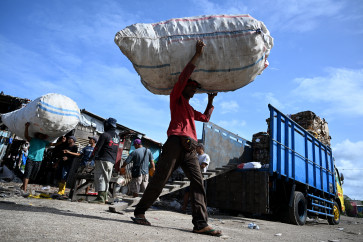Popular Reads
Top Results
Can't find what you're looking for?
View all search resultsPopular Reads
Top Results
Can't find what you're looking for?
View all search resultsBali’s battle against marine plastic waste
Indonesia, with its large population and extensive coastlines, faces an enormous challenge in managing plastic waste.
Change text size
Gift Premium Articles
to Anyone
As a priority tourism destination, Bali is at the forefront of Indonesia’s efforts to promote sustainable tourism.
With national attention on the island’s environmental impact, there is a growing push to implement policies and partnerships that reduce plastic waste, ensuring Bali remains a model of eco-friendly tourism and preserves its natural beauty for future generations.
The Bali administration has been progressively developing various strategies and policies to implement sustainable tourism areas. Such policies range from reducing single-use plastic waste all the way to protecting lakes, springs, rivers and the sea.
To reduce plastic waste in Bali, several trash racks have been installed to collect waste from rivers near estuaries, aiming to prevent plastic waste from reaching the sea. The administration is also actively collaborating with the recycling industry to promote plastic waste recycling.
Littering is a challenge for waste management in Indonesia. Combating this habit does require effort to increase public awareness from an early age, that the type of waste produced has different characteristics from the type of waste produced by previous generations.
The problem of plastic waste leaking into the sea will be worse if the waste is thrown into water bodies, rivers or drainage channels. Waste that is thrown on land/yards can also be carried by wind and water runoff to reach water bodies.
In 2021, a study showed that Indonesia is the fifth-largest contributor of marine waste in the world. The World Bank states that specifically in Indonesia, plastic leakage into the ocean ranges from 201,000 to 552,300 tonnes per year, and most of the transportation of plastic waste is through rivers.



















